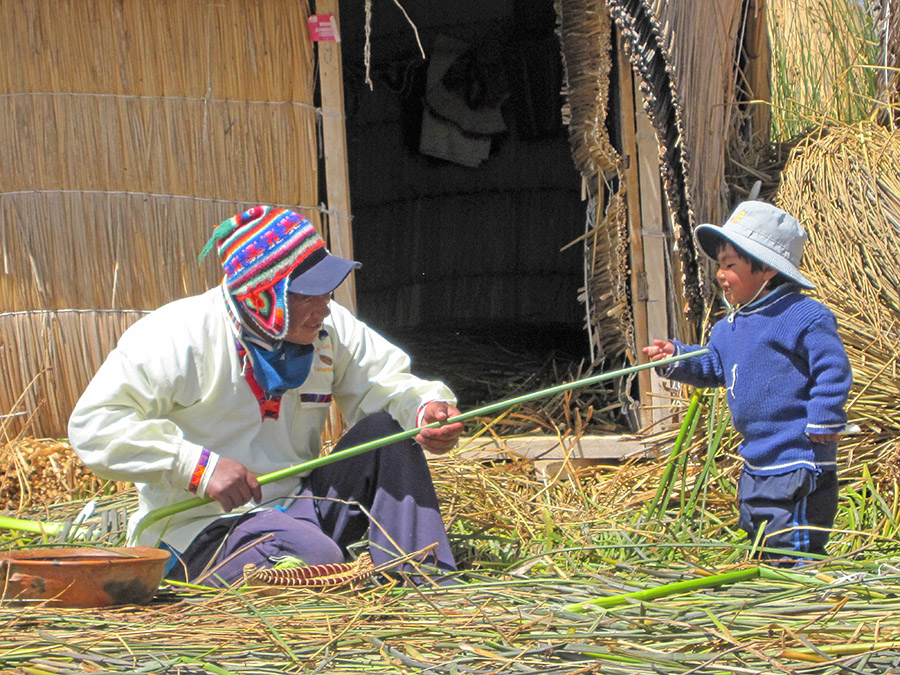By Mike Huber
No trip to Peru can be complete without a journey to Lake Titicaca. It is the largest alpine lake on the planet at an elevation of 12,500 feet, and the lifestyle of those who live on the lake is beyond fascinating. This huge lake is nestled in a giant basin between two of the Andean mountain ranges and extends across the border to Bolivia. And yes, it has a funny name. There was no way I was going to miss this place even though it was quite a distance from my home base in Cusco.
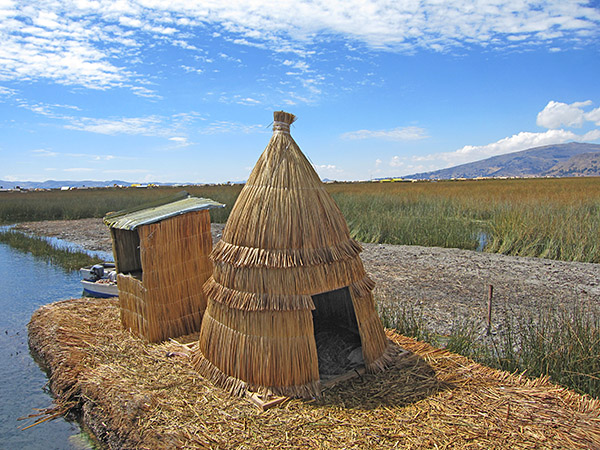 Having planned to use all my vacation time while in Peru, it wasn’t too difficult to load up on my work early in the week and take a four-day weekend to knock out Lake Titicaca (did I mention it has a funny name?). Allowing four days would provide me with enough time to take a leisurely tour bus to this region of Peru, get some hikes and tourist attractions in along the way, and then return on an overnight bus on Sunday. This would assure (hopefully) that I would make it to work on time Monday morning. Instilling project management principles usually results in a successful outcome. To me the planning of a project or a vacation followed the same rigid processes. Of course, the vacation ones always had a few surprises along the way that I would have to adjust to, but that’s part of the fun.
Having planned to use all my vacation time while in Peru, it wasn’t too difficult to load up on my work early in the week and take a four-day weekend to knock out Lake Titicaca (did I mention it has a funny name?). Allowing four days would provide me with enough time to take a leisurely tour bus to this region of Peru, get some hikes and tourist attractions in along the way, and then return on an overnight bus on Sunday. This would assure (hopefully) that I would make it to work on time Monday morning. Instilling project management principles usually results in a successful outcome. To me the planning of a project or a vacation followed the same rigid processes. Of course, the vacation ones always had a few surprises along the way that I would have to adjust to, but that’s part of the fun.
The bus ride was filled with incredible beauty with stops at local markets and panoramic mountain views that had me saying to myself “wow, I am in the Andes!” over and over again. Out of all the bus rides I’d been on, this was by far the most pleasant. I was used to the altitude, there were no Kirk Cameron movies, and I had made a special tea to enhance the ride (PM me for details on that, but it will probably bleed into another article). The entire ride was an extremely joyful 8 hours where I had an opportunity to meet two wonderful girls from Japan (we are still friends to this day).
Feeling beyond happy but tired, we finally pulled into the lakeside city of Pulmo, Peru. This first day here would be relaxing and adjusting to the world I had just entered. There was a giant golden condor statue on a steep hill above the city, which provided a sense of calm. There was a large market that made for great people watching while having some coca tea and even a coca beer. The beer was like a prehistoric provided a buzz and amp at the same time. It almost reminded me of my Jager bomb days in Boston. Thankfully for the people of Pulmo I didn’t take it that far.
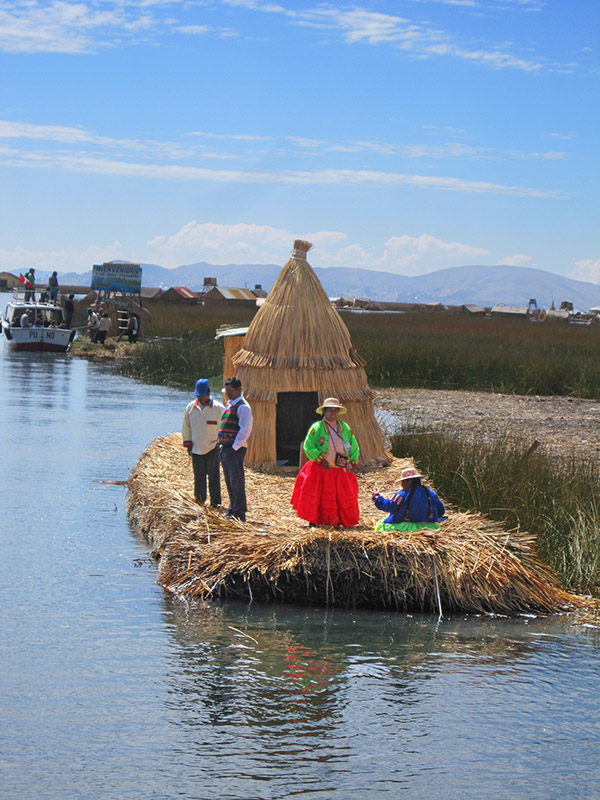
The next day I joined a boat tour that took us to many of the man-made islands. These islands were floating and made of dried totora, a type of papyrus the local population harvested from the lake marshes. The people are known as the Ura. The islands are fairly large, some of them over an acre or more in size. There were stores, restaurants, and cafes on some of the islands.
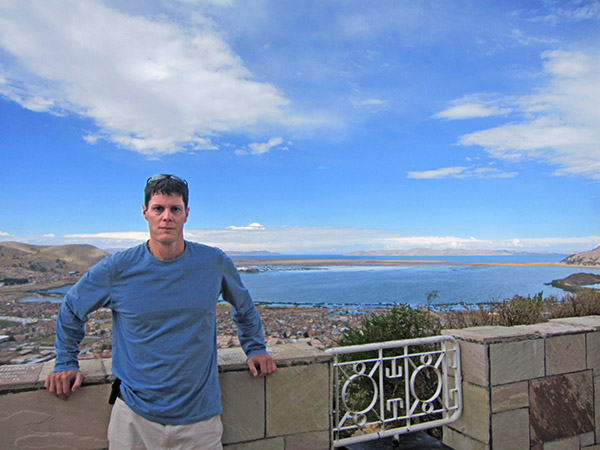
The islands were surprisingly stable and didn’t rock as we stepped onto them. When talking to one of the Ura (and speaking as well as I could in Spanish), I asked how they made the islands once they gathered the papyrus. It was a constant cycle of drying the papyrus, bundling them, and tying them to the upper part of the island. He showed me a hole cut into the center of one of the islands. It looked like a hole you would ice fish through and it was about 3 feet wide. The hole was large enough to see the bottom reeds starting to decay and back into the water. It was a constant process to keep their “land” from being swallowed by the lake. Many of the Ura, not much more than a mile offshore, hardly ever returned to the mainland shores of Pulmo. They much preferred their isolated yet tightly knit community on the lake where life was simple.
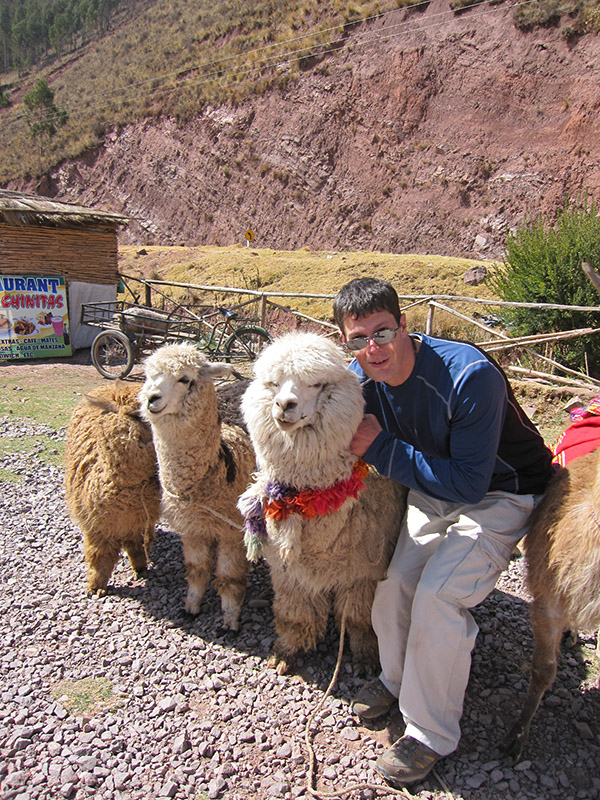
The city of Pulmo was so different from both the Amazon jungle and where I lived in Cusco. The more I explored Peru the more diverse and mystical it became. Sunday was a relaxing day with more coca beer and local foods with my new Japanese friends.
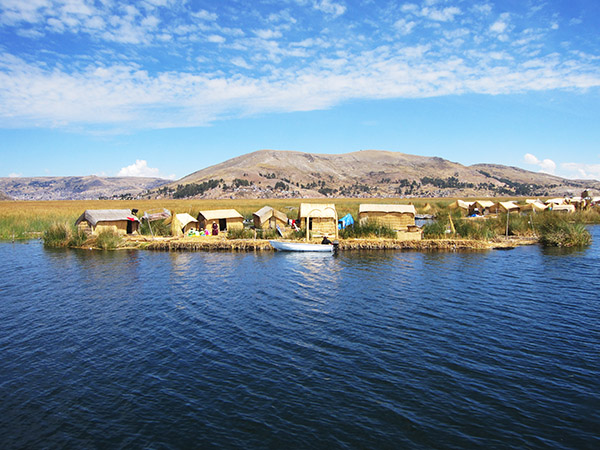
As the sun began to set it was time to find my way back to the bus depot and board the redeye that would return me to Cusco. It didn’t take too long for me to peacefully fall asleep on the bus. I didn’t wake up until the bus entered Cusco. It was a short taxi ride to my home and just in time to lead my first conference call of the day. Still bleary-eyed and having a buzz from the weekend (and the coca beer) my workday progressed as though the trip was just a dream. It was an adventure I wanted to share with my co-workers, but they wouldn’t understand as they were still under the assumption I was living in my condo in Boston. Throughout the day I wondered if and when I would ever return to Boston.

